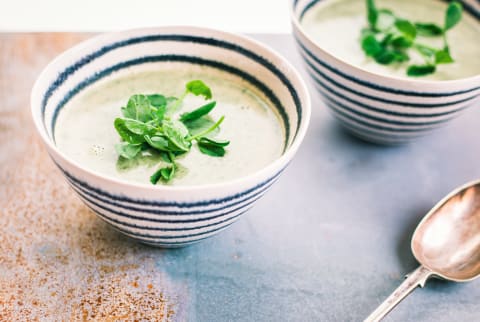Advertisement
Why Ayurveda Recommends Eating Warm, Cooked Foods All Year Long


As the Earth performs another revolution around the sun and winter turns into spring, I see folks in NYC lining up outside salad and smoothie bars that had been partly abandoned during the cold season.
But as an Ayurvedic doctor, I've noticed something else too: a surge in seasonal allergies—especially with those devoted to raw greens and cold blends. This gets at a fundamental truth from ancient practices like Ayurveda: No matter the season, our meals should be warm and cooked, not raw and chilled.
Here's why warm foods are best for maintaining your gut's ideal climate no matter the season, according to Ayurveda.
Digestive health in Ayurveda
Ayurveda teaches us that our gut thrives on warmth, enabling it to break down food efficiently. (Consider metabolism: It's practically synonymous with heat.) In Ayurvedic practice, the digestion process is called agni, which means fire. But agni is not fire that burns dry like a matchstick, prone to burning out. Rather, it is like the flame of an oil lamp: warm and moist, held by a fuel so it can be sustained.
It's hardly surprising that medical research continues to make daily discoveries that strongly link our immunity and health to our gut, more specifically, to our gut microbiome. Like any ecosystem, the microscopic inhabitants of our gut microbiome need a warm, moist habitat to flourish. Thus, in Ayurveda, keeping our gut environment warm and humid is crucial.
The impact of cold, raw foods
When cold foods, beverages, and water are consumed, they significantly douse the Agni, depriving the gut of its warmth and making digestion significantly harder. Instead of acting as an efficient stove, our gut turns into a fridge, stalling the breakdown of nutrients. By this logic, a cold morning smoothie does a disservice to gut health and overall vitality, demanding extra energy from our bodies to compensate for the chill.
Cooking, on the other hand, softens food and makes it moist as well as warm. Ayurveda also believes that cooking activates the agni present in the food, further easing the breakdown process.
This is why every traditional Ayurvedic recipe starts with spices being tempered in ghee. (Ghee, also known as "gut butter," is Ayurveda's cooking fat of choice.) Spice can also be used to enhance heat. Often, Ayurvedic recipes call for throwing in a cinnamon stick, bay leaf, cloves, or cardamom pod to foods like rice, legumes, and soup that require boiling. While sautéing, whole spices can also be tempered in oil. Using powdered spices like black pepper, cinnamon, etc., during cooking also works.
Are there any exceptions?
For these reasons, as an Ayurvedic practitioner, I believe that when we opt for raw, cold foods, we overburden our microbiome and dull our gut's vitality. Cooking simplifies nutrient breakdown and absorption, aligning with our body's needs. That said, I see room for some cold foods every now and again too.
Fruits, for example, can be eaten raw as they are "precooked" by the sun and come ready to consume. Certain other vegetables, such as cucumbers, avocados, tomatoes, and carrots, can be eaten raw, but I suggest adding a warm spice like black pepper or cumin to support their breakdown. During summer months, a side of salad can be enjoyed for lunch, once again with lemon juice or vinegar and olive oil for an added touch of warmth and moisture.
I always recommend cooking most of your own warm dishes at home (we spend so much time thinking about and reading about health—and I think if we took half of that time in our kitchen, we'd have much less to worry about) and appliances like Instant Pots, rice cookers, etc., can make it much easier to do.
The takeaway
Even the most nutrient-packed meals are in vain if our gut struggles to process them. Remember, you are not what you eat but what your body can absorb and digest. In Ayurveda, warm foods tend to be easier on the gut—so I recommend continuing to reach for cozy soups and stews throughout the spring and summer seasons too.

Why Nutrition Is Key To Changing Your Relationship With Alcohol
Brooke Scheller, DCN, CNS

Why Alcohol Sabotages Your Gut Health & How To Get Back On Track
Brooke Scheller, DCN, CNS

Why Nutrition Is Key To Changing Your Relationship With Alcohol
Brooke Scheller, DCN, CNS

Why Alcohol Sabotages Your Gut Health & How To Get Back On Track
Brooke Scheller, DCN, CNS

Why Nutrition Is Key To Changing Your Relationship With Alcohol
Brooke Scheller, DCN, CNS

Why Alcohol Sabotages Your Gut Health & How To Get Back On Track
Brooke Scheller, DCN, CNS

Why Nutrition Is Key To Changing Your Relationship With Alcohol
Brooke Scheller, DCN, CNS

Why Alcohol Sabotages Your Gut Health & How To Get Back On Track
Brooke Scheller, DCN, CNS














